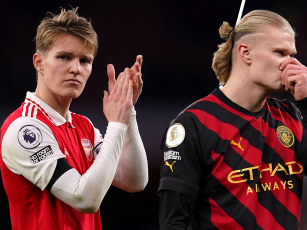As Iceland closed out their famous win over England last week the commentators on TF1, the French channel that was broadcasting the match live, talked of how the Euro first-timers were edging towards a “dream” quarter-final with the hosts France. One couldn’t help thinking – does nobody ever learn?
With high-profile contenders for Euro 2016 continuing to drop like flies, the way for France to take the title is opening ever wider, so the last thing they need is to be sucked into the same vacuum of complacency that claimed Roy Hodgson’s team. The nature of England’s undoing should be closely heeded, with Ragnar Sigurdsson’s quick equaliser in Nice, in particular, a close cousin of the sort of direct plays with which the Republic of Ireland caused Didier Deschamps’ team a number of difficulties during the last-16 in Lyon.
The far-improved second-half display against Martin O’Neill’s side – France’s most fluent of the tournament so far – has banished defensive concerns to the back of the mind. The switch to 4-4-2 after the break, with Kingsley Coman adding thrust out wide in place of N’Golo Kanté (who is banned for the Iceland game), added real verve to France, and allowed Antoine Griezmann to play as a second striker rather than on the right of attack, thus reprising the role he fulfils so successfully with Atlético Madrid. Whether Deschamps will be brave enough to continue with this dynamic, or whether he just straight-swaps Yohan Cabaye for Kanté, could be a key to this match.

France's Dimitri Payet, right, Samuel Umtiti, center, and Adil Rami, left, exercise during a training session at the Clairefontaine training center, outside Paris, France, Sunday, June 12, 2016. France will face Albania in a Euro 2016 Group A soccer match in Marseille on Wednesday, June 15, 2016. (AP Photo/Thibault Camus)
Getting it right at the back is important too, but conversely the suspension of Adil Rami, who struggled badly against the Irish, is widely thought to be something of a boon. He is likely to be replaced by Samuel Umtiti, the Lyon centre-back who will join Barcelona after the tournament. Though only 22 and yet to start a competitive match for France, he is already experienced and is a sanguine character.
The other major factor for France will be the venue, after their mini-tour outside the capital of Marseille, Lille and Lyon. Les Bleus’ relationship with the Stade de France crowd has always been a curious one. Eighteen years ago it was of course the scene of their greatest triumph, when Zinedine Zidane’s headed brace helped them sweep aside Brazil to win the World Cup and bring over a million people out onto the Champs-Elysées in celebration.
Since then, it has housed some altogether more uncomfortable moments. The low point was the 2001 friendly with Algeria, abandoned 15 minutes before the end when a group of mainly French-raised young fans from North African backgrounds invaded the pitch, with some chanting in support of Osama bin Laden, underlining the fact that 1998 had been more a placebo than a magic cure for national divisions.

This is a Saturday, Oct. 6, 2001 file photo of policemen as they drag away a spectator after dozens of Algerian supporters invaded the field during the France-Algeria friendly soccer match at the Stade de France in Saint Denis, north of Paris, Saturday, Oct. 6, 2001. France were leading 4-1 when the match was abandoned midway through the second half after the pitch invasion. (AP Photo/Francois Mori, File)
By the low point of the 2010 World Cup, it was a clear that a gulf had been opened between the public and the players, with the former struggling to connect with what they saw as a group of pampered millionaires, many of whom had left the Hexagon relatively early in their careers to join overseas clubs. It was tense.
Today, the link between the stands at Saint-Denis and the team is as strong as it has ever been. The World Cup playoff comeback against Ukraine in November 2013 was the catalyst, an epic night where team and fans fed off each other. Since then, the tetchiness has drained from the relationship.
The FFF (Fédération Française de Football) did well to bottle this enthusiasm in the aftermath, creating an official supporters club in 2014, just before the Brazil World Cup, offering members discounts on tickets and merchandise, and giving them a dedicated area in the stadium. 50,000 was the FFF’s membership target for the Euros. As of a week before the start of the tournament, the group had 120,000 members.
For those who have followed the French national team for a number of years, the change in atmosphere around the team is remarkable. That, rather than any tactical adjustments made by Deschamps, is perhaps the real déclic, as they say here. The mood is positive and personified by the huge popularity of Griezmann, a player who has come up the hard way, and who the public really can connect with. France know their team is not perfect, but that won’t necessarily stop them going all the way.
Download the brand new OffTheBall App in the Play Store & App Store right now! We've got you covered!
Subscribe to OffTheBall's YouTube channel for more videos, like us on Facebook or follow us on Twitter for the latest sporting news and content.








